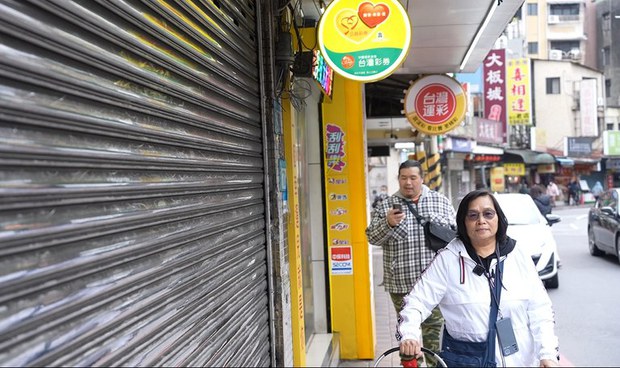Former Tuen Mun congee chef recreates taste of Hong Kong in exile
Share

For Sister Wan, who says she may never be able to return to Hong Kong, food is a way of preserving her links to home. From time to time, she drags her cart through different markets in Taiwan, looking for ingredients to make Hong Kong-style food.
In the three years since she fled Hong Kong, Sister Wan has become a familiar figure in the markets of the Taiwanese coastal town of Tamsui, as she seeks to recreate the foods that will recreate the tastes of home.
Like thousands of others, Wan left Hong Kong amid an ongoing crackdown on dissent to settle in democratic Taiwan, leaving behind a popular market stall in the city’s Tuen Mun district where she had sold tea and savory rice congee for six decades, to start afresh somewhere new.
Congee, known in Cantonese as juk, is known in many East and Southeast Asian cultures as a comfort food associated with sickness, and has historically also been associated with ritual fasting.
But in Hong Kong, it has diversified into a one-stop meal for all seasons, served up across the city by outlets ranging from cheap diner chains to neighborhood mom-and-pop operations made famous by their unique twist on the familiar recipe.
Leaving behind the family business was a wrench, and Wan hung on as long as she could, she told RFA Cantonese while shopping in Tamsui ahead of the Lunar New Year holiday.
“I kept working in Hong Kong and ignored the [political] waves that were happening,” she said, adding that she started making plans to leave during the 2019 protest movement and the subsequent crackdown on thousands of those who took part, most of them peaceful.
“I really started thinking about [leaving] in 2019,” she said. “The thing I regretted most was that my father started the stall and built it up from scratch into a family business.”
“It was small, but it supported two or three generations of our family,” said Wan, who didn’t give her full name for fear of reprisals. “A lot of people knew about us.”
“It’s a shame that it’s no longer there, but if I’d carried on, I wouldn’t have enjoyed a healthy old age,” she said. “That’s the way it goes – you have to make choices.”
Now a regular at Tamsui’s Yung Leh Lane market, Wan started out not even knowing the common local words for some of her key ingredients, nor where to buy them.
While many Hong Kongers pick Taiwan as a destination due to the cultural similarities – traditional Chinese culture, freedom of speech and a fondness for city life and street food – the two places have very distinct culinary traditions.
“A lot of the ingredients that we Hong Kongers take for granted aren’t very popular in the markets [here],” said Wan, who is on a mission to make a specific kind of Hong Kong snack that is typically eaten at Lunar New Year – water chestnut cake.
Except that it’s not that easy to source water chestnuts, known as “馬蹄 mǎtí,” or horse’s hoof, in Chinese.
“Even Taiwanese people don’t know that you can buy water chestnuts here,” Wan said. “Today there is only one stall [in Tamsui].”
Feeling homesick
Tamsui, tucked like Hong Kong between lush green hills and the sea, has been a favorite destination for Hong Kong exiles in Taiwan for several years now.
As shoppers throng Yung Leh Lane market ahead of Lunar New Year, the sound of Cantonese, Hong Kong’s lingua franca, mingles with the Mandarin and Taiwanese spoken by local people.
Wan’s goal is to put in a little extra effort this year to make the snack because it’s authentic food that will bring her friends and family in exile just that bit closer to home.
“This is the kind of thing we’re used to eating, and so these are our tastes,” she said. “I’ve made them before, so there’s no reason to give up just yet.”
She is determined to offer her loved ones in Taiwan a moment of food-based nostalgia.
“People all say when they taste them that they taste exactly the same as the [water chestnut cake] in Hong Kong,” Wan said.
“When I see [Hong Kongers] in Taiwan, I make them feel homesick,” she said. “They say ‘I haven’t had this in a long time.’”
Hong Kong police said last week that they have made 290 arrests so far under the national security law, which bans public criticism of the government and has resulted in the mass arrests and trial of dozens of former opposition activists and the trial of pro-democracy media mogul Jimmy Lai.
The government has said “national security” will remain at the top of a list of police priorities for 2024, when the city’s legislature is expected to pass a second national security law critics say will potentially criminalize more peaceful activities, including making critical or protest-related comments on overseas websites or interviewing exiled activists like Chow.
For Wan, who says she may never be able to return to Hong Kong, food is a way of preserving her links to home.
“I love to cook, and the most important thing is that I am satisfied with it, and that others say it tastes good.”
“That’s why I keep working hard at it,” she said.
Steering her shopping cart through the packed Tamsui market, Wan said she hopes other Hong Kongers will follow her example, and take good care of themselves in exile.
“Hang in there … there will always be a dawn,” she said.
Translated by Luisetta Mudie.







